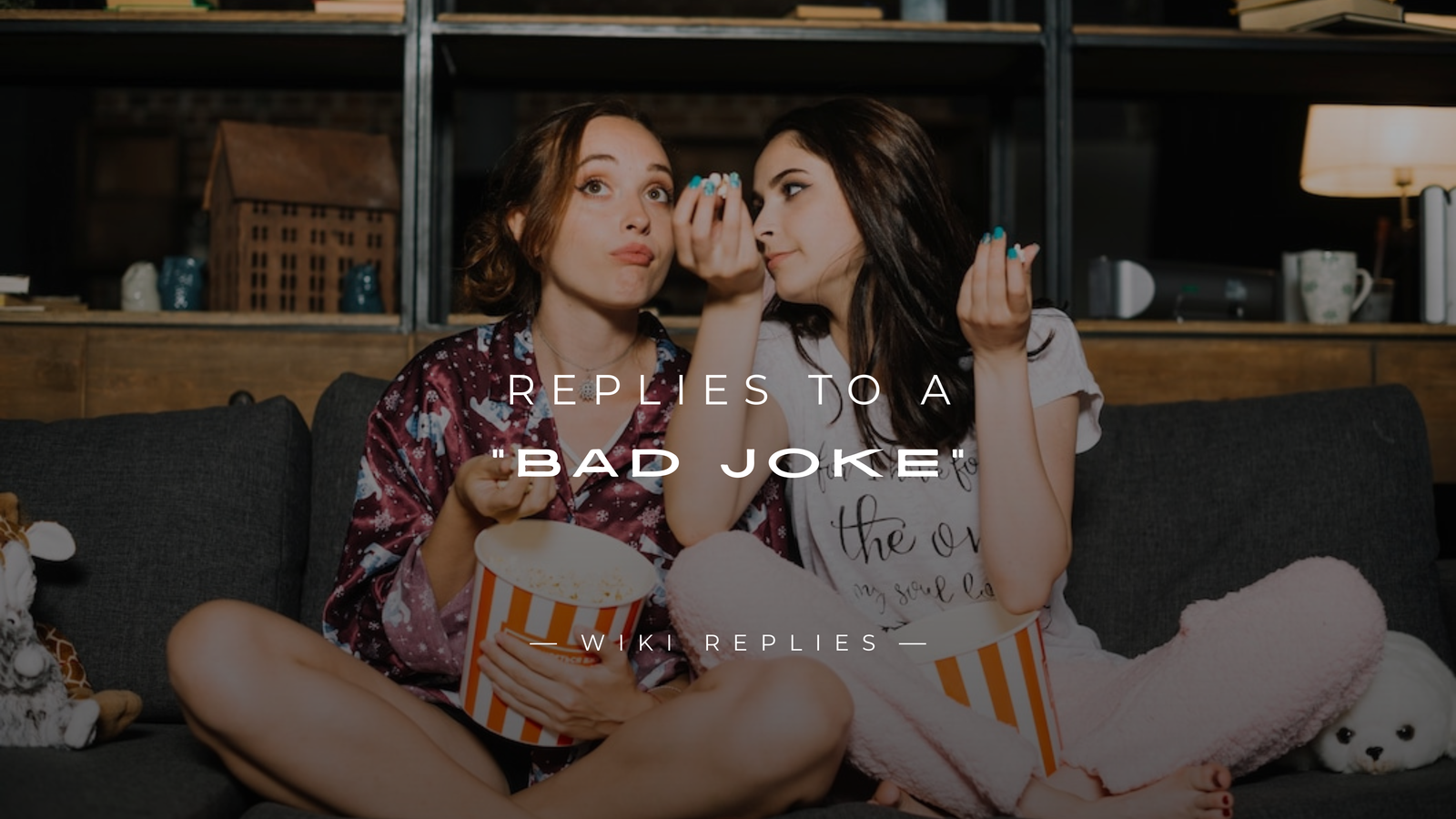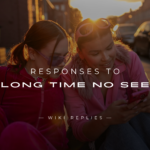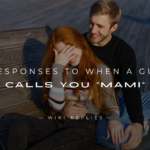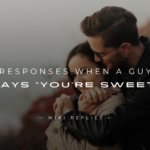We’ve all been in that awkward situation. You’re in the middle of a conversation, everything’s going smoothly, and then someone drops a joke that is… well, just bad. It might be cringeworthy, completely miss the mark, or even border on offensive. You don’t know whether to laugh, grimace, or pretend you didn’t hear it.
Whether it’s in the workplace, at a family dinner, or in a casual group chat, bad jokes can be tricky to respond to. Do you correct the person? Do you laugh it off? Do you ignore it and change the subject?
This article will walk you through how to handle these situations with grace, empathy, and maybe even a little humor of your own. We’ll explore why people tell bad jokes, what makes a joke fall flat, and how to respond in a way that protects your boundaries without escalating tension.

250+ Replies to A “Bad Joke”
Polite Encouragement
- Haha, not your best, but I see what you were going for!
- That was a brave attempt. Keep ‘em coming.
- It wasn’t great, but I admire the effort.
- Well… you’re trying, and that counts for something.
- I see where you were going with that!
- Not bad, just… needs a little polish.
- Comedy is hard. You’re on the right path.
- Hey, everyone starts somewhere.
- That joke has potential with the right crowd.
- You might be onto something if you refine it.
Sympathetic Laughter
- Haha… oh, buddy.
- Yikes… but I’ll give you a courtesy laugh.
- That was bad, but I’m laughing anyway.
- I’m laughing because it’s so wrong.
- That hurt, but I appreciate your enthusiasm.
- You just made my day… unintentionally.
- Haha, wow… you really said that.
- I don’t know why I’m laughing, but here we are.
- It’s terrible, but at least you’re committed.
- I’m smiling out of sympathy right now.
Affectionate Teasing
- That joke should be arrested.
- Did your dad text you that one?
- You’re banned from telling jokes for 24 hours.
- I love you, but never say that again.
- That was so bad, I almost called customer service.
- You’re lucky I like you.
- Please stop. My brain can’t take this.
- You’re lucky your charm makes up for your jokes.
- That joke made me question our friendship.
- I’m putting you on a joke probation.
Dad Joke Approval
- That was so bad, it was good.
- Classic dad-joke energy. I respect it.
- That pun hurt and healed me at the same time.
- Peak dad humor achieved.
- I live for these groan-worthy gems.
- You’re keeping the dad joke tradition alive.
- That was awful. I loved it.
- I’m putting that in my dad-joke collection.
- It was cringe, but I’m smiling.
- You just made every dad in the world proud.
Sincere Appreciation
- Honestly, I kinda liked it.
- That joke actually made me smile.
- It wasn’t perfect, but I appreciated the effort.
- There’s a charm to a joke like that.
- You made me laugh more than I expected.
- Simple, but it did the trick.
- I respect anyone who can tell a joke, good or bad.
- Not everyone has the guts to joke around. Kudos.
- It gave me a genuine chuckle.
- Sometimes, it’s the delivery that makes it work, and you nailed that.
Mock Praise
- Wow, that joke will go down in history… as the worst.
- Someone call the comedy awards, we’ve got a winner.
- I’ve never heard anything so impressively awful.
- Did Shakespeare write that one?
- Please, teach me your comedic ways.
- That joke changed my life… for the worse.
- I’ll be telling people about that for years, unfortunately.
- Bravo. You’ve reinvented what humor is.
- That was legendary in all the wrong ways.
- If bad jokes were an art form, you’d be a master.
Deadpan Sarcasm
- Wow. Hilarious. I’m in stitches.
- That joke really rocked my world.
- I’ll be laughing about that… never.
- Groundbreaking comedy. Truly.
- I’ve never heard something so life-changing.
- Oh, was that the punchline? Powerful stuff.
- You should take that act on the road. Like, far away.
- Riveting material. Can’t wait for the sequel.
- That joke belongs in a museum. Of bad ideas.
- My face hurts. From cringing.
Exaggerated Groaning
- Uggghhh… why would you say that?
- I felt that one in my soul.
- Please, my ears!
- That joke just aged me 10 years.
- I can’t believe I sat through that whole thing.
- The groan was involuntary.
- Why do you do this to us?
- You owe us all an apology.
- That was criminally bad.
- I need to lie down after hearing that.
Passive-Aggressive
- Bold choice… telling that out loud.
- That was certainly a… unique joke.
- You have a talent for memorable punchlines.
- I wish I had your confidence.
- That’s one way to clear a room.
- Well, no one else could’ve pulled that off.
- You’ve really outdone yourself this time.
- I’m just going to pretend I didn’t hear that.
- Next time, maybe try silence.
- I admire your commitment to bad humor.
Playfully Mean
- That joke should come with a warning label.
- I think I lost brain cells just hearing that.
- If jokes were crimes, you’d be serving time.
- That one physically hurt me.
- Who gave you permission to say that out loud?
- You should be arrested for that punchline.
- My ears are filing a complaint.
- You need a joke license, and it’s been revoked.
- You’re not allowed near microphones anymore.
- That joke was a personal attack on comedy itself.
Forced Laugh
- Haha… yeah… wow.
- Ohhh… heh. That’s… something.
- Ahaha… mmmhm.
- Hahaha… I totally got that…
- Lol… okay then.
- Hah… you tried.
- Ahah… I think my soul just left.
- Hehe… never again, please.
- Hahaha… ha. Just ha.
- Haha… do you have any other material?
Confused Reaction
- Wait… was that the joke?
- I don’t get it.
- What was the punchline supposed to be?
- Can you explain that?
- I’m missing something, aren’t I?
- Uh… I think I need a manual for that joke.
- Hmm… I’m processing…
- Was that meant to be funny?
- I feel like I missed a step.
- I’m lost. Please send directions.
Cringe Acknowledgment
- That made my spine curl.
- The secondhand embarrassment is real.
- I actually winced at that.
- That was so awkward, I felt it physically.
- My toes curled, and not in a good way.
- I felt a full-body cringe.
- Wow, that took courage… and zero editing.
- That made me question a lot of things.
- I don’t think I’ve recovered from that.
- I might need a minute to un-hear that.
“Why?” Reaction
- Why would you even say that?
- Just… why?
- Who asked for that joke?
- What was the reason?
- Why are you like this?
- What did we do to deserve that?
- That joke was completely uncalled for.
- Why now? Why here? Why me?
- I need answers. Immediately.
- Explain yourself.
Silence or Blank Stare
- …
- blinks slowly
- stares in disbelief
- silently judging
- processing noise
- long pause
- …That’s it?
- crickets
- gives up emotionally
- looks at imaginary camera like The Office
Joke Reversal
- That joke was so bad, it made me look funny.
- And yet, somehow… you’re the punchline.
- You’re joking, right? Or was the joke about you?
- That setup just made fun of itself.
- Oh, I thought you were the joke.
- Plot twist: the joke was actually on us.
- Wait… that was a setup for my joke, right?
- You delivered it, but I took the fall.
- The real joke is how you thought that would land.
- Now that’s what I call self-roasting.
One-Up the Badness
- That was rough, but listen to this one…
- You think that’s bad? I’ve got worse.
- Hold my drink, I’ve got a worse one.
- I see your bad joke and raise you a disaster.
- You started it, now let me finish it… badly.
- Let me make you feel better by being worse.
- Challenge accepted. Here’s mine:
- That was tragic, but I’ve got one that’ll ruin your day.
- If you think you’ve hit rock bottom, wait till you hear mine.
- Two wrongs don’t make a right, but here’s another one anyway.
Meta Commentary
- That joke just rewrote the definition of bad.
- We have officially entered the joke twilight zone.
- This moment will live in infamy.
- We should study that joke in comedy school… as a warning.
- You’ve created a moment I’ll never forget, no matter how hard I try.
- I think reality glitched when you told that.
- That joke broke the fourth wall and then ran.
- The joke told us, not the other way around.
- I think that joke exists in its own genre now.
- If that joke had a soundtrack, it’d be silence and regret.
Sarcastic Applause
- Wow, just wow. claps slowly
- Bravo. That was… unforgettable.
- And the award for worst joke goes to… you.
- Truly a masterclass in questionable humor.
- standing ovation For that tragedy of a joke.
- I didn’t know we were doing open mic night.
- Well done. You’ve achieved peak cringe.
- Please, take a bow. Then exit.
- That was… something. I’ll give you that.
- What a performance. You deserve… a time-out.
Pretend Shock
- Oh my gosh… you actually said that out loud.
- I was not emotionally prepared for that.
- You caught me completely off guard… and not in a good way.
- I need to sit down.
- How… how could you do this to us?
- I think the earth just paused.
- I didn’t realize you were capable of such chaos.
- I’m speechless. Truly.
- You warned no one. That was reckless.
- I’ll be telling my therapist about this moment.
Change the Subject
- So anyway, what are your weekend plans?
- Let’s never talk about that again. Moving on.
- Hey, did you catch the game last night?
- Speaking of nothing related to that joke…
- Ok, back to reality.
- You know what’s actually funny? Weather lately.
- That joke didn’t happen. So, lunch?
- I think we’ve covered comedy for today.
- Let’s pivot to something safer… like taxes.
- That was… wow. Anyway, how’s your dog?
Ignore It
1.
2. pretends not to hear anything
3. …
4. keeps scrolling phone
5. sips drink in silence
6. no reaction whatsoever
7. checks watch dramatically
8. acts like the joke never happened
9. looks out the window
10. stares blankly and moves on
Play Dumb
- Wait, was that a joke?
- Oh… I thought you were serious.
- I don’t get it. Was there a punchline?
- Are you quoting someone?
- Oh, that wasn’t just a random sentence?
- Hmm, is that from a movie or something?
- Was that an inside joke?
- Are we supposed to laugh now or later?
- I’m not sure what just happened.
- Is that one of those experimental jokes?
Literal Interpretation
- Wait, but that doesn’t actually make sense if you think about it.
- But that’s not how that works in real life.
- That would never happen.
- You know that contradicts basic physics, right?
- Hmm, the logic there is questionable.
- No one actually says that though.
- That’s not even possible, biologically speaking.
- Actually, by definition, that wouldn’t work.
- I’m just going to correct that real quick.
- Let’s break that down scientifically.
Offer Help
- Do you want help writing your next one?
- I know a few websites with good jokes, want a link?
- Let’s workshop your material a bit.
- That had potential, we can fix it.
- I’ve got some punchlines you could borrow.
- Let’s sit down and talk about joke structure.
- It might help to run your material by someone first.
- We can get through this, together.
- Next time, try it out on a test audience.
- I’ll help you rewrite that one. Or bury it.
The Subjectivity of Humor
Humor is one of the most subjective things in human interaction. What makes one person laugh uncontrollably might make another person squirm in discomfort. Cultural background, personal experiences, current mood, and even timing all influence how someone receives a joke.
That’s why two people can hear the same joke and have completely different reactions. One might burst into laughter while the other sits in silence, unsure of how to respond. This subjectivity is important to understand before labeling a joke as “bad.” It may just be bad for you but not for someone else. On the other hand, some jokes truly are universally out of line, which brings us to the different categories of bad jokes.
Types of Bad Jokes
- Offensive Jokes
These are jokes that rely on racial stereotypes, sexist remarks, homophobia, or other forms of discrimination. Even if the person telling the joke claims they were just trying to be funny, these types of jokes can cause harm and perpetuate negative biases.
Offensive jokes often make people feel targeted, excluded, or dehumanized. While some comedians may use shock value or controversial topics to make a statement, the average bad joke told at work or at the dinner table rarely has any deeper meaning. It just comes off as insensitive.
- Cringeworthy or Awkward Jokes
These are the jokes that might have been intended to be lighthearted but end up falling flat because they are poorly timed, poorly delivered, or just downright awkward. Sometimes the joke is too long, and by the time the punchline comes around, nobody is paying attention anymore. Other times, the delivery lacks confidence or the joke simply doesn’t make any sense in the current context.
You’ve probably experienced this type before when someone nervously blurts out something “funny” and then laughs at their own joke while everyone else just stares. It’s uncomfortable for everyone involved.
- Overused or Corny Punchlines
There are jokes that might have been funny the first time you heard them but have now been repeated so many times that they’ve lost their charm. Think of dad jokes, knock-knock jokes, or jokes that rely on clichés. While these are usually harmless, they can quickly become annoying or tiresome, especially if someone tells them repeatedly in serious or inappropriate settings.
These types of jokes aren’t necessarily offensive, but they can wear on people’s patience if overused.
Why People Tell Bad Jokes
- Seeking Attention or Connection
Sometimes, people tell bad jokes because they want to feel included. Humor is a natural way to build connection, and even a failed attempt at a joke is often just someone’s way of saying, “I want to be part of this group.” It’s a social risk that doesn’t always pay off, but the intent behind it is often positive.
They may not have a great sense of humor, but they are trying to engage. Responding to this kind of bad joke with kindness can help avoid unnecessary embarrassment.
- Nervousness or Social Anxiety
Believe it or not, people often resort to humor when they feel anxious or out of place. A bad joke might be their way of breaking the ice or calming their own nerves. They might not be thinking clearly and just say the first thing that pops into their mind, hoping it will be funny.
In these situations, the bad joke isn’t about the content but about the person’s comfort level. A gentle, understanding response can help them feel more relaxed and more connected to the group.
- Misreading the Room
Another common reason for bad jokes is misjudging the audience or the situation. For example, someone might try to make a joke in a serious meeting or tell a dark joke in a cheerful setting. They might not mean any harm, but their lack of awareness leads to discomfort.
People who misread the room often have a blind spot when it comes to social cues. They think they’re being funny and are surprised when others don’t respond positively.
First Things First: Assess the Intent
Before you respond to a bad joke, try to take a breath and assess the situation. Was the person trying to be funny in a harmless way, or was there a more troubling intent behind it?
- Was It Malicious or Harmless?
This distinction matters a lot. If someone is clearly using humor to insult, ridicule, or belittle others, that’s not just a bad joke. That’s a red flag. On the other hand, if the joke was simply awkward or poorly timed, a lighthearted response might be all that’s needed.
Taking a moment to think about the intent can help you choose the right tone in your reply.
- Consider the Relationship With the Joker
How well you know the person matters too. If it’s a close friend, you might feel comfortable giving honest feedback or playfully teasing them about their failed joke. If it’s your boss or a stranger, you may want to be more diplomatic.
The closer the relationship, the more freedom you usually have to be direct. In more formal or distant relationships, it’s better to keep things neutral and respectful.
Different Ways to Respond to a Bad Joke
Now that you’ve assessed the joke and the joker, let’s explore your options.
- The Polite Chuckle
Sometimes the simplest response is the best. A polite chuckle acknowledges the joke without encouraging more of the same. It’s like saying, “Okay, I see what you were going for,” without fully endorsing it.
This is especially useful in social situations where you don’t want to create tension but also don’t want to fake a big laugh.
- Redirecting the Conversation
If you want to move past the joke without making a scene, you can quickly shift the topic.
Try something like, “Haha… so anyway, what did you think of that presentation?” This tactic gently removes the spotlight from the joke and places it on a more neutral topic.
- Using Humor to Deflect
Responding to a bad joke with your own lighthearted comment can keep the mood upbeat while subtly pointing out the joke’s flaws. For example, if someone tells a joke that falls flat, you could say, “That one’s going on the ‘do not repeat’ list,” with a grin.
This way, you keep the energy playful but still send a message.
- Calling It Out Nicely
If you’re close enough with the person, a little honesty can go a long way. Say something like, “Yikes, that one missed the mark!” with a laugh. You’re not shaming them, but you’re also not pretending the joke worked.
This can actually strengthen your relationship by showing that you’re willing to be real with each other.
- Giving Constructive Feedback (When Appropriate)
In long-term relationships or close friendships, you might want to help the person improve their sense of humor. Offer feedback kindly.
Say, “Hey, I know you’re trying to be funny, but some of your jokes feel a little outdated. You’ve got a good sense of humor maybe just update the material a bit.”
Responses to Avoid
- Public Shaming or Embarrassment
No one likes being humiliated in front of others. Even if the joke was offensive, public shaming usually backfires. It can make the person feel attacked, defensive, and less likely to learn from the experience.
Try to keep any criticism private and respectful when possible.
- Sarcastic Retorts That Sting
Sarcasm can be a great tool for humor, but it can also come off as mean if not used carefully. If your sarcasm is laced with frustration or condescension, it could escalate the situation.
- Ignoring the Person Completely
Sometimes silence speaks volumes, but ignoring someone altogether can feel dismissive or cold. If the person was just trying to engage and made a poor choice, it’s better to gently guide them than to shut them out.
Situational Responses
- In the Workplace
Professional environments call for diplomacy. If a coworker makes a bad joke, especially one that crosses the line, a simple, “Let’s keep things respectful” or “Not sure that’s workplace-appropriate” can set a boundary without making a scene.
- Among Friends
With friends, you can be more candid. “Man, that joke was awful. Do you write these down or do they just come to you?” said in a joking tone can get the point across while keeping the vibe fun.
- Family Gatherings
Family can be tricky. You don’t want to start an argument at Thanksgiving dinner, but you also don’t want to let things slide forever. A gentle but firm comment like, “Hey, let’s keep it light no need to go there,” can help steer things back on track.
- Online Interactions
If someone tells a bad joke in a group chat or on social media, you can reply with a funny meme or GIF to lighten the mood. If the joke is offensive, consider sending a private message instead of publicly correcting them.
When the Joke Crosses the Line
- Setting Boundaries
If a joke is outright offensive or hurtful, you have every right to say so. “I’m not okay with that kind of humor” is a perfectly valid response. You’re setting a clear line without getting into a debate.
- Speaking Up Without Escalating
Use “I” statements to express your discomfort. For example, “I felt uncomfortable with that joke” sounds much less confrontational than “You’re offensive.” It opens the door for a more productive conversation.
- Reporting If Necessary
In work or school environments, if a joke crosses into harassment or discrimination, it’s appropriate to report it to HR or a supervisor. There’s a difference between a bad joke and a harmful one.
How to Maintain Your Composure
- Breathing Techniques for Instant Calm
If you feel yourself getting upset or flustered by a joke, take a few deep breaths before responding. Inhale for four seconds, hold for four, exhale for four. It can help you reset and respond more thoughtfully.
- Rehearsing Neutral Replies
It helps to have a few neutral go-to phrases ready, such as “Interesting perspective” or “I don’t really find that kind of thing funny.” These keep your tone calm and help de-escalate the moment.
How to Use Humor to De-escalate
- Funny Comebacks Without Offense
Try a playful response like, “That joke should come with a warning label” or “You’re not getting paid for that one, are you?” It keeps the tone fun while making your point.
- Self-Deprecation as a Tool
You can also use yourself as the punchline to soften the moment. “Even I’m not brave enough to tell that joke, and I’ve made some bad ones” shows humility and humor while subtly correcting the person.
When You’re the One Making the Bad Joke
- Reading the Room
If your joke didn’t land, don’t double down. Pay attention to facial expressions and body language. If people aren’t laughing, it’s okay to move on without making it awkward.
- How to Apologize Without Making It Awkward
Simply say, “Okay, that one was a flop. I’ll retire it now.” Acknowledging it with humor shows maturity and self-awareness.
Teaching Moments: Helping Someone Improve Their Humor
- Suggesting Better Timing or Delivery
You can say, “Your jokes would land better if you slowed down a bit before the punchline.” Delivery can be just as important as the content.
- Sharing Resources or Examples
Send them a funny video or stand-up clip that fits the tone you’re aiming for. Humor is a skill, and like all skills, it can be improved with the right exposure.
The Psychology Behind Laughter and Offense
- Why We React Differently to Humor
Everyone has different triggers, life experiences, and senses of humor. Something you find hilarious might remind someone else of a painful memory. That’s why it’s important to be mindful, especially in diverse groups.
- Cultural Sensitivity and Humor
Jokes don’t exist in a vacuum. Cultural context matters. As we become more globalized, it’s essential to understand that humor that works in one setting might be offensive in another.
Encouraging Empathy Through Humor
- Creating Space for Growth
When someone tells a bad joke, you don’t have to cancel them. Offer them a chance to learn and grow. Most people appreciate a chance to do better.
- Balancing Kindness With Honesty
You can be kind and honest at the same time. Give feedback in a way that helps rather than harms.
Conclusion
Bad jokes are a universal experience we’ve all heard them, groaned at them, and sometimes, secretly loved them. But having a sharp, funny, or sarcastic reply ready can turn even the worst joke into a memorable moment. With this ultimate list of over 250 brilliant responses, you’re now equipped to handle any pun, dad joke, or cheesy one-liner that comes your way. Whether you’re texting friends or navigating an awkward conversation, these replies will help you keep your cool and your comedic edge. Want more witty responses? Don’t miss our 250+ Replies to What’s Good (WSG) – Funny, Flirty & More for even more conversational gold.
FAQs
Q. What if someone keeps telling bad jokes despite my signals?
Try being more direct. Say, “Hey, I know you’re joking, but those kinds of jokes don’t sit well with me. Can we keep it lighter?”
Q. Can I still be friends with someone who makes offensive jokes?
Yes, if they’re willing to listen and grow. Everyone makes mistakes, but if someone refuses to change after you express your discomfort, that’s a red flag.
Q. How do I confront a boss or superior about an inappropriate joke?
Use professional, respectful language. Say something like, “I just wanted to mention that I felt uncomfortable with the joke earlier. I value a respectful environment, and I’m sure you do too.”
Q. What’s a non-awkward way to change the subject after a bad joke?
Use a topic switch with light humor. “That was… unique. Anyway, did you guys hear what happened in the news today?”
Q. Is it ever okay to laugh just to be polite?
Yes, in some social settings, a polite laugh can ease tension. But don’t overdo it. Your authenticity matters, and your laughter should feel real, not forced.










